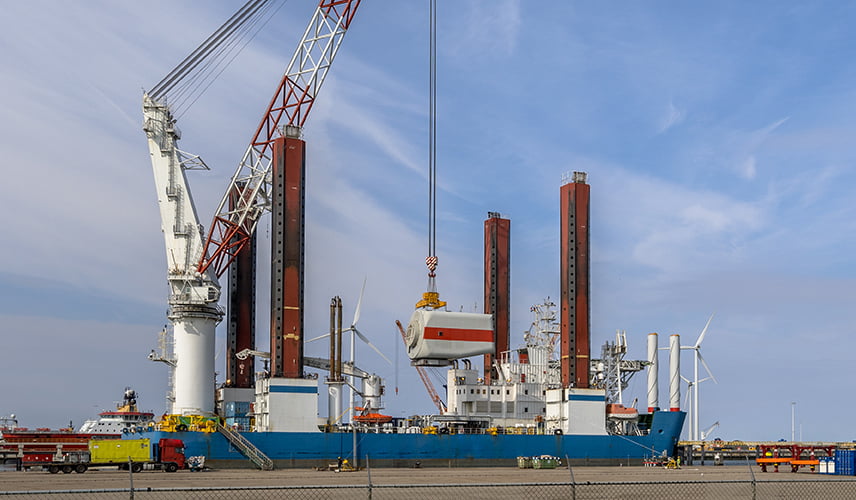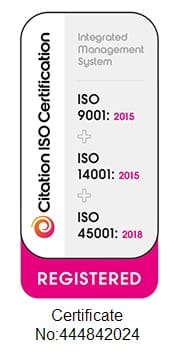CRANE OPERATORS

A Crane Operator in the offshore renewable energy wind industry and shipping industry is a highly skilled professional responsible for safely operating heavy-duty cranes used for various tasks in offshore environments and shipping terminals. These operators play a critical role in handling equipment, materials, and cargo, ensuring efficient and safe operations.
Crane Operators in the offshore renewable energy wind industry and shipping industry are vital for ensuring the efficient and safe handling of equipment, cargo, and materials. Their expertise contributes significantly to the success of offshore wind energy projects and shipping operations while maintaining a strong commitment to safety and compliance with industry-specific standards and regulations.
Safe Crane Operation: Prioritise safety as the top concern during all crane operations. Operate cranes in a manner that minimises risks to personnel, equipment, and the environment.
Equipment Inspection: Conduct thorough pre-operation inspections of the crane, including checking hoisting systems, cables, hooks, controls, and safety mechanisms to ensure they are in proper working condition.
Load Handling: Lift, move, and position heavy loads, equipment, cargo, and materials according to lifting plans, load charts, and job specifications. Ensure loads are correctly attached and balanced.
Communication: Maintain clear and effective communication with the lifting supervisor, rigging teams, signal persons, and other personnel involved in lifting and cargo-handling operations. Follow instructions and signals precisely.
Lifting Plans: Review and follow lifting plans and procedures developed by the Appointed Person for Lifting Operations, including load calculations, rigging configurations, and risk assessments.
Environmental Conditions: Operate cranes in various weather conditions, including high winds, rain, and challenging sea conditions, which are typical in offshore and marine environments.
Equipment Maintenance: Perform routine maintenance tasks on the crane, such as lubrication, inspection for wear and tear, and reporting any defects or issues promptly. Ensure that the crane remains in peak operating condition.
Emergency Response: Understand emergency procedures and be prepared to respond to incidents such as equipment malfunctions, power failures, or personnel injuries during lifting operations.
Documentation: Maintain accurate records of all crane operations, including lift reports, equipment inspection reports, incident reports, and maintenance logs.
Training and Certification: Maintain up-to-date training and certifications required for crane operation in the specific industry and location. Stay informed about industry-specific safety standards and regulations.
Education: A high school diploma or equivalent is typically required. Specialised training in crane operation, safety, or a related field is essential.
Certifications: Relevant certifications, such as Crane Operator Certification and safety certifications (e.g., GWO, OSHA), are often mandatory.
Experience: Several years of experience as a crane operator, with a focus on offshore and marine environments. Experience operating cranes on offshore wind farms or in shipping terminals is highly valuable.
Technical Knowledge: Profound knowledge of crane operations, load dynamics, rigging techniques, crane types (e.g., mobile, tower, gantry), and safety protocols specific to the industry.
Safety Orientation: Strong commitment to safety with a proven track record of adhering to safety standards and promoting a safe work environment.
Problem-Solving: Strong problem-solving skills to address technical challenges, adapt to changing conditions, and make quick decisions during lifting and cargo-handling operations.
Communication: Effective verbal and written communication skills to understand instructions, relay information, and collaborate with team members.
Teamwork: Ability to work collaboratively with the lifting supervisor, rigging teams, signal persons, and other personnel involved in lifting operations and cargo handling.
Physical Fitness: Good physical fitness and stamina are important, as crane operation can be physically demanding, involving long hours and physically challenging conditions.
CONTACT RELO WIND
We are dedicated to be the premier source of skilled personnel and exceptional teams, driving successful growth for our clients and partners. We are committed to delivering the talent and expertise needed to fuel achievement, innovation, and lasting success together.

